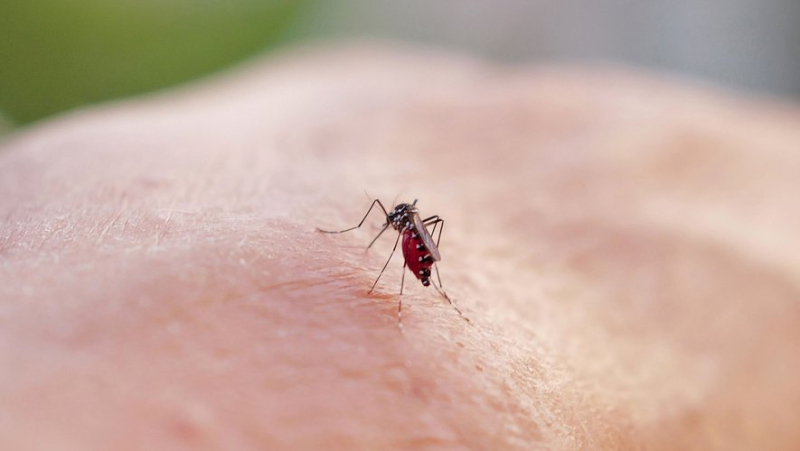Paris 2024 Olympic Games: traps, insecticides… the hunt for tiger mosquitoes in the starting blocks four months before the event

Vectors in particular of the dengue virus, which causes a brutal fever, and whose incidence is exploding in Brazil and French Guiana, tiger mosquitoes will be persona non grata at the Olympic Games. Valery HACHE/AFP
The fight against tiger mosquitoes will be a combat sport at the Olympic Games: manufacturers are already on a war footing to install their traps, an alternative to insecticides in the face of an insect which is now playing at home in France .
On Wednesday, the Regional Health Agency (ARS) confirmed the establishment of this mosquito in Normandy, until then the last region of metropolitan France to be spared. Vectors in particular of the dengue virus, which causes a brutal fever, and whose incidence is exploding in Brazil and French Guiana, tiger mosquitoes will be persona non grata at the Olympic Games.
Four months before the event which is expected to attract millions of visitors, arboviruses, diseases transmitted by the tiger mosquito (dengue, chikungunya and zika), are part of the infectious risks < em>"taken into account" in the mapping of health risks identified by the General Directorate of Health and for which " enhanced monitoring and surveillance will be put in place".
In France, 45 cases of dengue fever were recorded in 2023, caused by transmissions of the virus in France."When you are sick with dengue fever, you are not going to jump the hedge. The Olympic cities and in particular the Olympic village must be mosquito free", in other words without tiger mosquitoes, so as not to contaminate athletes or tourists, recommends entomologist Didier Fontenille, specialist vector-borne diseases.
Tackling "water collections" stagnant area, where the tiger mosquito develops, could, according to him, "solve 80% of the problem" . A "citizen mobilization" to be combined with "traps when it's relevant, repellents, mosquito nets, larvicides of biological origin".
Flower cups, water catchers, or a simple upside-down cap: a few millimeters of water are enough to serve as a nest for this unusual mosquito. & ;quot;It spends the winter in the form of eggs. The eggs have not yet hatched but we are starting to be vigilant", underlines Mr. Fontenille, research director at the Research Institute for Development ( IRD) in Montpellier.
The tiger mosquito, with black and white stripes, "continues its geographic expansion" and "where it is already present, its abundance continues to increase", summarizes Mr. Fontenille. A phenomenon favored by climate change.
Sterilize
Also, mosquito trap manufacturers are in the race to promote their solutions. This capture mode replicates the odors of the human body to attract and suck in these 5mm creatures. Another type of trap serves as a place to lay eggs.
The Biogents company "won a call for tenders to protect the Olympic marina in Marseille", where the sailing events will take place, notes one of the three directors, Hugo Plan. "The installation of 15 traps is planned for April 26 on one hectare", "in the vegetation, in the shade in a humid environment"< /em>, he specifies.
"During the competition, there will be regular visits by the teams to ensure the maintenance and proper functioning of the traps" recessed in metal boxes 80 cm high and long, to protect them against possible acts of vandalism.
Present in around a hundred countries, Biogents, which has been studying the behavior of mosquitoes for more than 20 years in its laboratory in Bavaria (Germany), is aimed at tourism professionals as well as communities and researchers.
Between 2019 and 2023, its turnover increased 8-fold in France thanks to sales to individuals. Same trend at Qista, another mosquito control specialist. In 10 years, the Provençal SME has deployed "13,000 terminals in 26 countries", says its founder Pierre Bellagambi who calls himself "available to the Games organizing committee but also to the authorities and communities".
Traps are generally used in a prevention context and to protect certain sensitive populations (nurseries, schools, nursing homes, hospitals). To reduce the population of Aedes albopictus, research is working to modify their DNA or to sterilize males using X-rays in an insect farm, before releasing them into protected areas where they mate with females. wild without producing offspring.
"The Olympic village would have been ideal for experimenting with this sterile insect technique", sighs Didier Fontenille who would have dreamed of a life-size experience with the Olympics.




